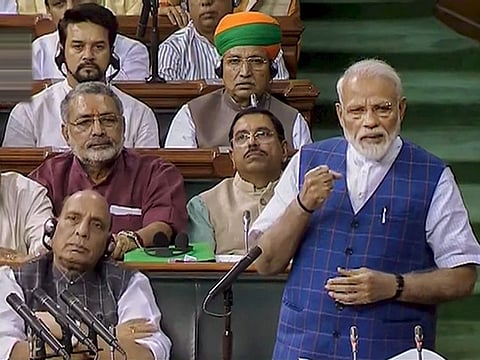The first 30 days of Modi government, and a death
It would have been better if Mohua Moitra’s fiery speech had come from Rahul Gandhi

The first 30 days of the Narendra Modi government have sent out signals of its intentions. Characteristically, they are dismaying and encouraging all at once. On May 26, in his acceptance speech addressing the members of the new Indian Parliament, he said: “Due to vote bank politics, Indian minorities were crushed, boxed into a corner, subjected to imaginary fears, and exploited during the elections. Like the poor, they remained covered with a cloud of deception. It would have been better if their health, their education had been taken care of ... We have to earn their trust.”
Less than a month later, on June 22, in the state of Jharkhand, a 24-year-old man, Tabrez Ansari, was lynched by a mob. He was tied to a tree — the uses of the tree are many — and beaten so severely, he later died in police custody. The video was hard to watch. Modi said of the incident that he was pained; but he also said Jharkhand as a state — which does have a history of such incidents — should not be stigmatised as the Opposition was trying to do.
Ansari was the first fatal casuality of hate of the new Modi regime. That the Sensex on the same day closed on a record high of 39,831 points, is precisely the irony of the situation; that the BJP seems to be licensing violence has no bearing on the economic hope of the people. The two sentiments appear to be increasingly mutually exclusive. As is happening in the US as well, where a divisive Trump politics is delivering on business and economy.
The rise of Amit Shah, now the home minister, too has been unmistakable in the last one month. It is clear he has taken a load off Modi’s shoulders.C.P. Surendran
Barely weeks into its second term, the Modi government came up with the idea of One Nation, One Election. Essentially, it means in order to cut down on time and management time, India should go in for parliamentary election and assembly elections to its 29 states and a handful of Union Territories simultaneously. This was interpreted to be a fascist measure, an anti-Constitutional step, in fact, toward no election at all — gradually.
Hours after the new cabinet was sworn in, Ravi Shankar Prasad, who was also the minister heading the law and related departments in the earlier Modi dispensation, said his ministry will not function as a ‘post office.’ He said his ministry has a legitimate “stake” in institutions like the Supreme Court. He did add he would always be protecting that stake “in consultation with the honourable Supreme Court.” Since the Supreme Court is about to hear important cases like the Rafale (the 36-war jet acquisition from French firm Dassault, which the Congress Party leader Rahul Gandhi alleged Modi intervened in favour of Anil Ambani, brother of his close ally and India’s richest man, Mukesh Ambani), the nature of the ‘honourable consultations’ is open to interpretation
The rise of Amit Shah, now the home minister, too has been unmistakable in the last one month. It is clear he has taken a load off Modi’s shoulders. Politically sensitive topics of scrapping Article 370 of the Constitution giving Kashmir special status and limiting Parliament’s law making powers over the region have been fixed in Shah’s sharp sight. It is a matter of time — and Shah sets much strategic importance on the timing of his major moves — before he pulls the trigger.
These are potentially ground-breaking moves. You could call them bold. Or agenda laden. The fact is, if the economy continues to do well, Modi could easily accord them legitimacy in the 545-seat Parliament as the BJP owns 303 seats.
Also Read: An open letter to Rahul Gandhi
Also Read: Modi must work for a modern inclusive India
It is virtually a single party government, a point that the maiden speech of the new MP, Mohua Moitra, made in Parliament last week. Moitra is from West Bengal’s Trinamool Congress led by Mamata Banerjee. Moitra’s shrill if fiery speech went viral. The former investment banker pointed out what she thought was the fascist design of the Modi government. There was nothing new in the speech, but a certain tenor and tone, a hard spark, which made it instantly clear that Moitra plans to set a lot of things on fire in the near future. The liberal media, always in search of a hero/heroine, vied with each other to accord her that status. It would have been far better for India if that bold speech had come from Rahul Gandhi.
Which brings us to the deep tragedy, besides Ansari’s awful fate, of the first 30 days of Modi’s government. The disarray of the Congress. As the second single biggest party (52 seats), the Congress so far has not gathered its wits. Gandhi, traumatised by his party’s performance resigned from his position as president. Some 200 Congress leaders — reluctantly — followed suit in solidarity.
But all this just won’t do. Gandhi has to find it in himself to recoup and lead. Get up and fight, sucker, get up and fight, as Muhammad Ali said to Sonny Liston when he took the fall in their second match in 1965. Liston just rolled over. Gandhi could do it, too. Or pick himself up, and continue. The match is not over yet. And everybody is watching still.
C.P. Surendran is a senior journalist based in India
Sign up for the Daily Briefing
Get the latest news and updates straight to your inbox



